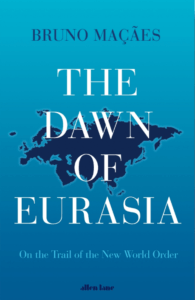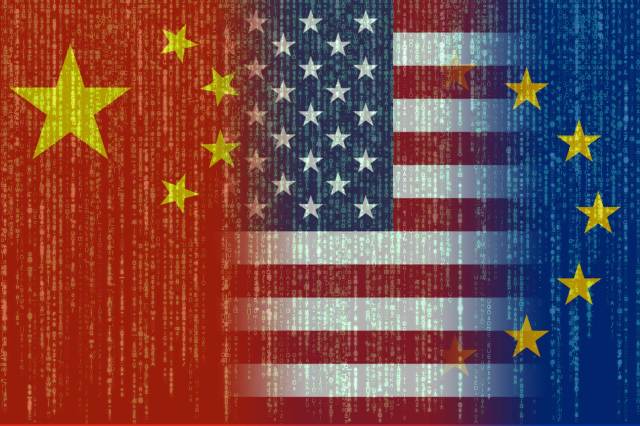
It was only a week ago that I last wrote about China and technology – and I’m doing the same thing again today. I am sorry about this. To address these issues no more than weekly is to greatly underplay their importance, so please accept my apologies.
 Luckily, there are other writers to turn to. Not least, Bruno Maçães, a former Portuguese minister, whose book The Dawn of Eurasia has established him as must-read author on all matters East-West.
Luckily, there are other writers to turn to. Not least, Bruno Maçães, a former Portuguese minister, whose book The Dawn of Eurasia has established him as must-read author on all matters East-West.
In an article for Politico he warns that “the great conflict of our time is about who can control the next wave of technological development: the widespread application of artificial intelligence in the economic and military spheres.”
It’s not a point lost on the Chinese:
“Last July… China’s State Council issued its New Generation AI Development Plan, with the explicit goal of attaining AI supremacy in just a few years.
“By 2030, China seeks to become the world’s ‘primary’ AI innovation center, with a core AI industry gross output exceeding RMB 1 trillion ($150.8 billion) and AI-related gross output exceeding RMB 10 trillion ($1.5 trillion). In one of the most recent moves, Chinese authorities announced they will build a $2.1 billion AI technology park in Beijing’s western suburbs.”
Maçães is less impressed by the forthcoming European Union AI strategy, of which he’s seen a draft:
“I was asked to comment on a draft of the AI strategy the European Commission will publish on April 24. My initial assessment is that it has almost nothing to do with reality.
“The text is still doing the rounds inside the Commission. There may be time for improvements, although that is running out fast…
“The argument in the new strategy is fully defensive. It first considers how AI raises new threats and then goes on to discuss the opportunities. The EU and Chinese strategies follow opposite logics.”
Maçães says that the core of the EU’s strategy is about developing a “charter on AI ethics” – which is nice, but ultimately irrevelant if Europe is peripheral to the development of the technology itself.
Europe is already handicapped in having no equivalent to the US tech giants – and further embarrased by the fact that China does. It is barely in the race to master this world-changing technology, having no answer to the commercial vigour of the Americans or the statist determination of the Chinese.
Europe’s best bet may be a ‘soft power’ approach – i.e. to be the place where the world’s smartest people come together to research and develop the AI tech of the future.
However, it doesn’t help that Europe’s leading research universities are in the United Kingdom (on its way out of the EU) and Switzerland (never in the EU).
A crucial issue is access to data – in particular the labelled data that AI systems ‘learn’ from. Maçães notes that China has access to “almost unlimited pools of data” gathered from its carefully protected domestic market and from the various arms of the Chinese state. It seems reasonable to assume that Chinese companies will have preferential access to this vital resource.
The US tech giants don’t enjoy the same degree of help from their government, but they have a vast and globalised customer base to gather data from.
In theory the EU could pursue a strategy of ‘data integration’ – i.e. standardising the collection and formatting of data across federal, national and regional agencies – to create a shared resource on a Europe-wide scale. There’d be language barriers to overcome, of course. But, on the other hand, Europe’s linguistic and cultural diversity has the potential to yield up an especially rich flow of data.
Aside from the challenge of funding and coordinating such an effort, the big problem would be one of unequal rewards. In a scenario where high quality machine-ready data flows freely across borders, those companies that already have a lead in developing AI tech are likely to see that lead extented. If, in an EU context, those companies are concentrated in one country – most likely, Germany – the politics could get awkward.
I’m not sure the other nations of the EU would appreciate becoming data tributaries to the dominant AI economy.
Many of Peter’s UnPacked columns are regularly discussed in short podcasts. They’re listed here.










Join the discussion
Join like minded readers that support our journalism by becoming a paid subscriber
To join the discussion in the comments, become a paid subscriber.
Join like minded readers that support our journalism, read unlimited articles and enjoy other subscriber-only benefits.
Subscribe